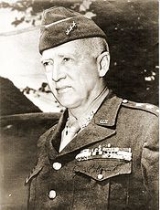
officer
best known for his leadership while commanding corps and armies as a general during World War II
. He was also well known for his eccentricity and controversial outspokenness.
Patton was commissioned in the U.S. Army after his graduation from the U.S. Military Academy at West Point
in 1909. In 1916–17, he participated in the unsuccessful Pancho Villa Expedition
, a U.S.
I wonder if I could have been here before as I drive up the Roman road the Theater seems familiar — perhaps I headed a legion up that same white road... I passed a chateau in ruins which I possibly helped escalade in the middle ages. There is no proof nor yet any denial. We were, We are, and we will be.![]()
Wars may be fought with weapons, but they are won by men. It is the spirit of the men who follow and of the man who leads that gains that victory.![]()
The more I see of Arabs the less I think of them. By having studied them a good deal I have found out the trouble. They are the mixture of all the bad races on earth, and they get worse from west to east, because the eastern ones have had more crosses.![]()
Now in war we are confronted with conditions which are strange If we accept them we will never win. Since being realistic, as in mundane combats fistic We will get a bloody nose and that's a sin.![]()
Some goddamn fool once said that flanks have got to be secure. Since then sonofabitches all over the globe have been guarding their flanks. I don't agree with that. My flanks are something for the enemy to worry about, not me. Before he finds out where my flanks are, I'll be cutting the bastard's throat.![]()
Have taken Trier with two divisions. What do you want me to do? Give it back?![]()

